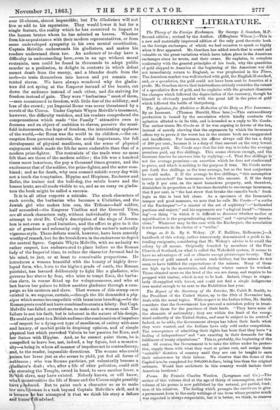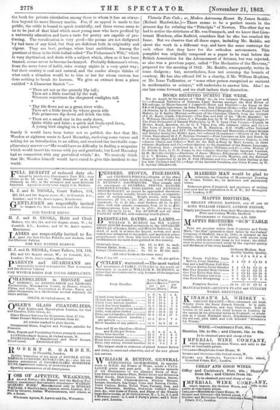Poems. By Francis Charles Weedon. (Longman and Co.)—The author of
this volume died at the age of thirty of consumption, and this volume of his poems is now published by the natural, yet partial, fond- ness of his relatives. The feeling which prompts the survivors to give a permanent form to the early writings of ono from whose promise much was expected is always respectable, but it is better, we think, to reserve the book for private circulation among those to whom it has an attrac- tion beyond its mere literary merits. For, if an appeal is made to the public, the critic is bound to speak truthfully, and these verses seem to us to be just of that kind which most young men who have profited by a university education and have a taste for poetry are capable of pro- ducing. The versification is very good-the poems are not disfigured by bad taste of any kind, but they are deficient both in originality and vigour. They are beat, perhaps, when least ambitions. Among the prettiest of them is the little ballad called "The Fisherman's Wife," which is very rhythmical, and deals with a subject which, often as it has been treated, seems never to become hackneyed. Probably fishermen's wives, from the mere force of habit, take stormy nights in a very quiet way ; but their anxiety is real and natural, and the reader always thinks of what such a situation would be to him or her for whom custom has done nothing to break its horrors. We give an extract from a piece entitled "A Character Sketch ":- " Thou art not as the queenly lily tall ; Thou art a little rosebud by the wall, Whereon sometimes the chequered sunlights fall.
"Thy life flows not as a great river wide; Thou sat a little brook by whose green side Pale primroses dip down and drink the tide.
"Thou art a small star in the early dawn, Quite white and faint ; a quick and fresh-eyed fawn, A young bird singing on a quiet lawn."
Surely it would have been better not to publish the fact that Mr. Weedon at eighteen wrote to Lord Macaulay, enclosing some verses and asking for an introduction to an editor, and received the inevitable com- plimentary answer :-"He would have no difficulty in finding a magazine which would insert his verses with joy and gratitude, but Lord Macaulay had no connection with any periodical which," &c. We scarcely think that Mr. Weedon himself would have cared to give this incident to the world.































 Previous page
Previous page